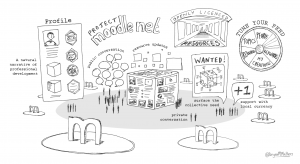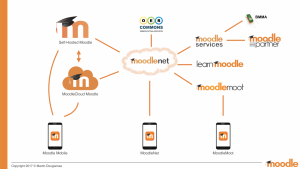MoodleNet: Difference between revisions
Helen Foster (talk | contribs) m (Reverted edits by Tsala (talk) to last revision by Doug Belshaw) |
Doug Belshaw (talk | contribs) mNo edit summary |
||
| (45 intermediate revisions by 3 users not shown) | |||
| Line 1: | Line 1: | ||
[[File:Moodlenet-logo.png|400px]] | [[File:Moodlenet-logo.png|400px]] | ||
Short URL | Short URL: '''https://moodle.com/moodlenet''' | ||
''Note: This page describes a new project started in 2017 | ''Note: This page describes a new project started in 2017. For the legacy mechanism of inter-connecting multiple Moodle and Mahara sites into a network, please see the [https://docs.moodle.org/en/MNet MNet] page.'' | ||
<div style="background-color:#F87F16; padding:10px; text-align:center; color:white; font-size:1.2em; margin-bottom:1%;">Check out the draft [https://docs.moodle.org/dev/MoodleNet_whitepaper Project MoodleNet whitepaper]</div> | |||
== What is MoodleNet? == | == What is MoodleNet? == | ||
MoodleNet | [[File:moodlenet-landscape.png|thumb|The MoodleNet landscape: CC BY-ND [https://bryanmmathers.com Bryan Mathers] (click to enlarge)]] | ||
[[File:1600px-moodlenet- | [[File:1600px-moodlenet-ecosystem.png|thumb|The MoodleNet ecosystem (click to enlarge)]] | ||
MoodleNet will be an integral part of the Moodle ecosystem. | Project MoodleNet is currently described by Martin Dougiamas, CEO of Moodle as, '''"a new open social media platform for educators, focussed on professional development and open content"'''. MoodleNet will be an integral part of the Moodle ecosystem. We'll be building out this page as the project develops. | ||
Currently, we envisage Project MoodleNet consisting of eight components which we have listed below in the order that we are considering tackling them: | |||
# Authentication | |||
# Social networking | |||
# Profile | |||
# Connection to open content | |||
# Forum | |||
# Global search | |||
# Dashboard | |||
# Crowdfunding | |||
= | For more details, please see the [https://docs.moodle.org/dev/MoodleNet_whitepaper draft white paper] or this [https://docs.google.com/presentation/d/1CL22Ld4tOEvemWAU6K8d4OpRRx9pG9V2LqIRTXjzYXI/edit#slide=id.p slide-based overview] (Jan 2018) | ||
* Blog | Project MoodleNet will be built according to the following principles. The links below take you to a blog post unpacking each one: | ||
* [https:// | |||
* [https://tracker.moodle.org/secure/RapidBoard.jspa?rapidView=81&projectKey=MDLNET | * [https://blog.moodle.net/2018/principles-open/ Open] | ||
* [https://blog.moodle.net/2018/principles-safe/ Safe] | |||
* [https://blog.moodle.net/2018/principles-private/ Private] | |||
* [https://blog.moodle.net/2018/principles-ethical/ Ethical] | |||
* [https://blog.moodle.net/2018/principles-transparent/ Transparent] | |||
* [https://blog.moodle.net/2018/principles-connected/ Connected] | |||
== Updates == | |||
There are many options for keeping up-to-date with Project MoodleNet: | |||
* [https://blog.moodle.net/ Blog] - official project updates by the team | |||
* [https://moodle.org/mod/forum/view.php?f=1243 Discussion forum] - a place to discuss and debate the various aspects of the project | |||
* [https://t.me/project_moodlenet Telegram channel] - smaller updates about the project (also provides notifications when blog posts are published) | |||
== Organisation == | |||
To keep track of work on the project we are using Trello cards linked to JIRA issues: | |||
* [https://trello.com/b/0KCE6858/project-moodlenet Trello board] | |||
* [https://tracker.moodle.org/secure/RapidBoard.jspa?rapidView=81&projectKey=MDLNET JIRA issue tracker] | |||
== Feedback == | == Feedback == | ||
* [https://docs.moodle.org/dev/MoodleNet-meetings Notes from meetings] | * [https://docs.moodle.org/dev/MoodleNet-meetings Notes from meetings] | ||
* [https://docs.moodle.org/dev/MoodleNet-MootUS17 Miami MoodleMoot (Nov 2017)] | * [https://docs.moodle.org/dev/MoodleNet-MootUS17 Miami MoodleMoot sessions (Nov 2017)] | ||
<div style="background-color:yellow; padding:10px; text-align:center; color:black; font-size:1.2em; margin-bottom:2%; margin-top:2%;">Got comments? Feedback? Head to the [https://moodle.org/mod/forum/view.php?id=8352# Project MoodleNet forum]!</div> | |||
== | == Misc. == | ||
* [https://docs.moodle.org/dev/MoodleNet/Decision_Log Decision log] | |||
* [https://docs.moodle.org/dev/MoodleNet-research Research] | |||
* [https://docs.moodle.org/dev/MoodleNet-metaphors Explaining MoodleNet] | |||
[[es:MoodleNet]] | [[es:MoodleNet]] | ||
Revision as of 11:02, 7 March 2018
Short URL: https://moodle.com/moodlenet
Note: This page describes a new project started in 2017. For the legacy mechanism of inter-connecting multiple Moodle and Mahara sites into a network, please see the MNet page.
What is MoodleNet?

Project MoodleNet is currently described by Martin Dougiamas, CEO of Moodle as, "a new open social media platform for educators, focussed on professional development and open content". MoodleNet will be an integral part of the Moodle ecosystem. We'll be building out this page as the project develops.
Currently, we envisage Project MoodleNet consisting of eight components which we have listed below in the order that we are considering tackling them:
- Authentication
- Social networking
- Profile
- Connection to open content
- Forum
- Global search
- Dashboard
- Crowdfunding
For more details, please see the draft white paper or this slide-based overview (Jan 2018)
Project MoodleNet will be built according to the following principles. The links below take you to a blog post unpacking each one:
Updates
There are many options for keeping up-to-date with Project MoodleNet:
- Blog - official project updates by the team
- Discussion forum - a place to discuss and debate the various aspects of the project
- Telegram channel - smaller updates about the project (also provides notifications when blog posts are published)
Organisation
To keep track of work on the project we are using Trello cards linked to JIRA issues:

